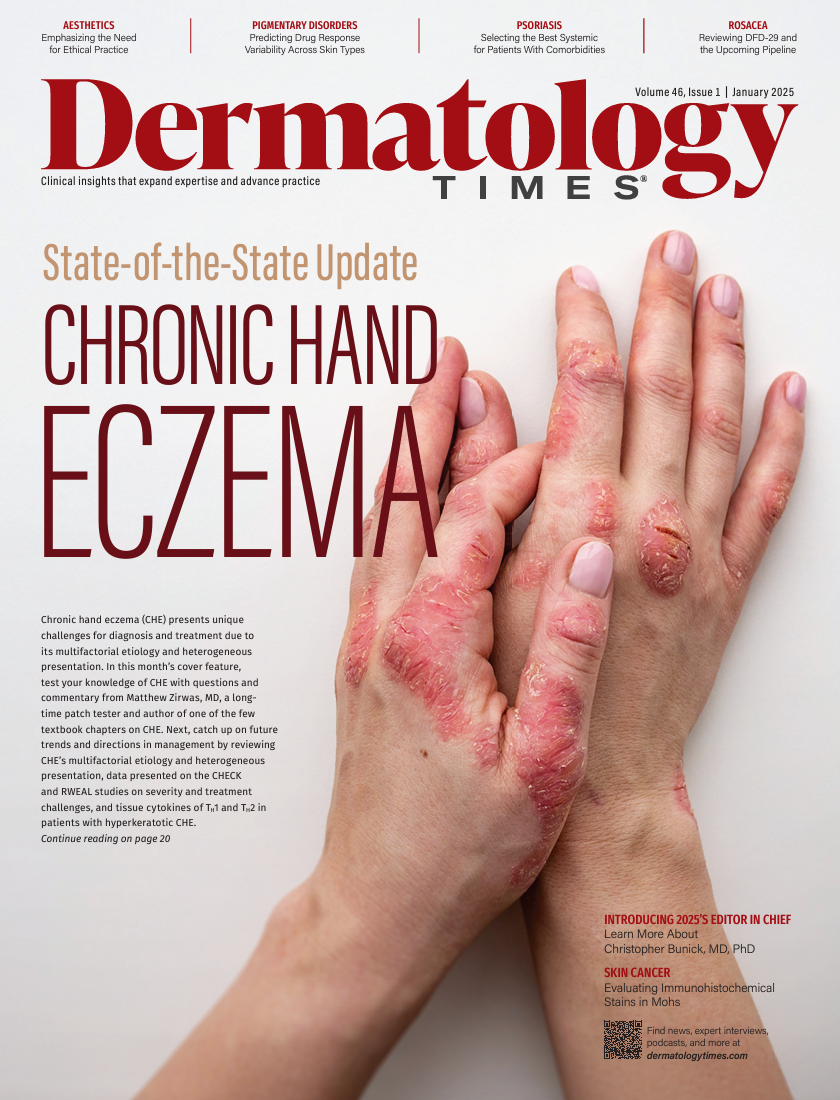- Acne
- Actinic Keratosis
- Aesthetics
- Alopecia
- Atopic Dermatitis
- Buy-and-Bill
- COVID-19
- Case-Based Roundtable
- Chronic Hand Eczema
- Chronic Spontaneous Urticaria
- Drug Watch
- Eczema
- General Dermatology
- Hidradenitis Suppurativa
- Melasma
- NP and PA
- Pediatric Dermatology
- Pigmentary Disorders
- Practice Management
- Precision Medicine and Biologics
- Prurigo Nodularis
- Psoriasis
- Psoriatic Arthritis
- Rare Disease
- Rosacea
- Skin Cancer
- Vitiligo
- Wound Care
News
Article
Dermatology Times
Unveiling the Complexities of Atopic Dermatitis Care
Author(s):
Key Takeaways
- Atopic dermatitis impacts quality of life, causing sleep disruption, bullying, and psychological issues like depression and anxiety.
- Treatment challenges include insurance barriers, adherence issues, and misconceptions about food allergies as AD triggers.
Experts explore innovative therapies, psychosocial impacts, and education strategies for managing atopic dermatitis in a Dermatology Times video series.

In the Dermatology Times Expert Perspectives custom video series “Exploring the Comprehensive Care and Treatment of Atopic Dermatitis,” Rob Casquejo, PA-C; Douglas DiRuggiero,DMSc, PA-C; James Song, MD, FAAD; Lisa Weiss, PA-C; and Karan Lal, DO, FAAD, delve into the complexities of managing the chronic condition. Each leader in the field shared their pearls on the topic, from clinical challenges to innovative treatments and the psychosocial impacts on patients and families.
Psychosocial and Family Burden
Atopic dermatitis (AD) significantly affects quality of life for patients and their families. Weiss, a dermatology physician assistant, noted the ripple effect of disrupted sleep for patients, caregivers, and siblings. She emphasized that children with visible symptoms often face bullying, whereas adults with severe facial involvement may struggle with self-confidence and social interactions. DiRuggiero elaborated on the psychological toll, linking AD to depression, anxiety, and suicidality.
Lal added that untreated AD could result in growth delays, malnutrition from restrictive diets, and increased school absences. He emphasized that educating families to avoid unnecessary dietary restrictions and recognize the chronic nature of AD is critical to mitigating its impact.
Treatment Challenges and Adherence
Effective management of AD faces barriers such as insurance limitations, adherence issues, and misconceptions about treatment. Casquejo highlighted how insurance hurdles often restrict access to advanced therapies, requiring clinicians to advocate for patients. Weiss discussed common parental misconceptions, such as associating AD with food allergies, explaining that food-related triggers are less common than believed.
Weiss also identified issues with treatment routines, such as parents misusing moisturizers and medications. To address this, she and Lal recommended using clear, written eczema action plans that outline step-by-step instructions for applying treatments. Lal stressed the importance of proper tapering of topical steroids in pediatric patients to avoid withdrawal effects or overuse. Both underscored the need to empower parents with education and practical tools, like samples and coupons, to improve adherence and outcomes.
Emerging Therapies: Innovations in Precision Medicine
The experts discussed advances in systemic and topical therapies that are transforming AD treatment, such as:
Biologic Therapies
- Song highlighted the effectiveness of biologics like lebrikizumab and nemolizumab, which target specific pathways to reduce inflammation and itch. These therapies show prolonged efficacy even after treatment ends, marking a significant advancement in managing moderate to severe AD.
Topical Janus Kinase Inhibitors
- Casquejo and DiRuggiero praised ruxolitinib cream, a topical Janus kinase (JAK) inhibitor, for its rapid itch relief and lack of adverse effects like skin atrophy. Weiss expressed optimism about these nonsteroidal options, which alleviate long-term steroid use concerns, particularly in children.
Other Advances
- Lal highlighted practical tools like hypochlorous acid sprays and thermal spring water sprays to reduce itch and inflammation in children, particularly those engaged in sports. He said these portable solutions empower children to manage mild flares independently.
Barriers to Treatment Access and Adoption
Navigating regulatory approvals and insurance formularies presents challenges for new treatments. Song noted that although newer therapies offer improved safety and efficacy, insurers often favor established options, hindering widespread adoption. DiRuggiero emphasized the importance of long-term real-world data and clinician advocacy to overcome these barriers.
Enhancing Patient Care and Education
All agreed that educating patients and caregivers is essential for effective AD management. Casquejo stressed that outdated warnings about adverse events often perpetuate misconceptions, particularly about topical treatments. DiRuggiero and Weiss advocated for proactive communication to build trust and ensure adherence.
Weiss emphasized providing families with tangible resources, like product samples and coupons, to make treatment more accessible and actionable. She also suggested creating a family-based approach to care, ensuring that parents feel supported and empowered to manage the condition effectively.
Role of Precision Medicine
Precision medicine is transforming AD treatment by targeting specific pathways while minimizing adverse events. Song described how newer therapies, such as biologics and JAK inhibitors, represent a shift from broad immunosuppressants to precise interventions, likening it to replacing “B-52 bombers” with “Navy SEAL snipers.” Lal emphasized the potential of these treatments to interrupt the progression of the atopic march, reducing risks for related conditions like asthma and allergic rhinitis.
Future Directions
Some stated telemedicine offers opportunities to enhance access to care for emerging therapies. Weiss highlighted how virtual consultations facilitate early diagnosis, ongoing management, and patient education. Lal advocated for systemic changes in schools and day care facilities, such as allowing moisturizers and sprays on campus and training children to manage mild flares independently.

Newsletter
Like what you’re reading? Subscribe to Dermatology Times for weekly updates on therapies, innovations, and real-world practice tips.




















